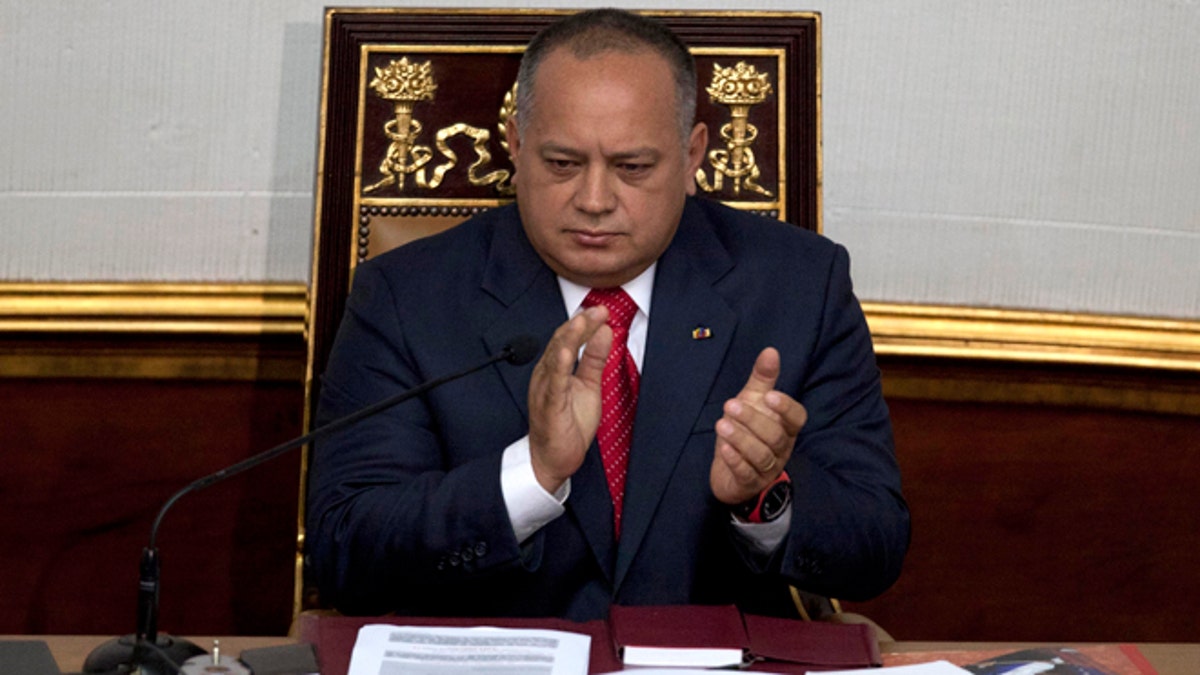
FILE - In this Jan. 5, 2013 file photo, National Assembly President Diosdado Cabello applauds before addressing the National Assembly in Caracas, Venezuela. Cabello said on Wednesday, May 13, 2015 he is asking courts to bar news executives from leaving the country while heâs suing them for alleged defamation. (AP Photo/Ariana Cubillos, File)
Even as U.S. federal authorities are beginning to close in on Diosdado Cabello, the president of Venezuela’s National Assembly who is being investigated for drug trafficking, high-ranking officials in the country are doing all they can to try and shield him from any pending charges.
On Monday of this week, the Wall Street Journal and Washington Post reported that the U.S. Drug Enforcement Administration was looking into allegations that Cabello had turned the country into a global hub for cocaine trafficking and money laundering.
Two days later, Gladys Gutiérrez, the head of the country’s Supreme Court, declared that the press stories “have no basis in reality,” and therefore “don’t have any legal effect inside Venezuela.”
She also warned that publishing articles that “lack veracity carries sanctions under the nation’s laws.” Although U.S. newspapers would almost certainly not be sanctioned, she seemed to be threatening local press to stay away from the story or they would be fined or thrown in jail.
Gutiérrez appeared at a press conference in order to defend Cabello. “All these reports just try to damage Venezuela’s institutions,” she said. “They are not based on any credible data.”
The Supreme Court was just one of many government-related groups that have launched an aggressive public relations crusade to defend Venezuela’s No. 2 politician from charges he turned the country into a narcostate.
President Nicolás Maduro gave the order to start a campaign defending the Assembly president on Tuesday night during his weekly TV show.
"I am publicly calling on all the social movements, the United Socialist Party of Venezuela (PSUV), the youth, women and the working class. Whoever messes with Diosdado, messes with me. Let’s defend Diosdado as we defended the country against the U.S. aggression in March,” referring to sanctions that were levied by the Obama administration on seven high-ranking officials in the Venezuelan government suspected of human-rights abuses.
On Wednesday, Chavista followers began carrying out Maduro’s command.
In the morning, a group of PSUV congressmen met with Venezuela’s Attorney General, Luisa Ortega Díaz, to join the suit Cabello filed in April against local media outlets that published information reprinted from a Spanish outlet alleging that Cabello was involved in drug trafficking.
After the meeting with Ortega Díaz, Elvis Amoroso, the first vice-president of the National Assembly, told reporters, “Diosdado won’t kneel in front of anyone. We are asking for justice, publishing news like that without proof is not real journalism.”
Hours later, the second vice-president of the assembly, Tania Díaz, led a news conference organized by a group of women members of the ruling PSUV.
Cabello’s accusers are “trying to weaken Venezuela’s institutions,” she said. “They focus on the National Assembly because we have elections this year.”
As the different press conferences were taking place, the government began to push on Twitter the hashtag #DiosdadoTeApoyamos (“Diosdado we support you”).
The accounts of party leaders and government-owned media outlets even added the hashtag to messages that didn’t have anything to do with the lawmaker, just to turn it into a trending topic.
Later the government tried to get another Twitter hashtag to catch on, and this one did become the No. 1 trending topic in Venezuela: #ApoyoaDiosdadoporque (“I support Diosdado because”).
On Thursday the campaign continued.
The Chavista party’s youth wing sent out a statement reading, “Why doesn’t the U.S. government investigate drug use in its country? Easy, a society like America, under the influence of drugs and alcohol, won’t oppose its government’s commands.”
That night, another hashtag was created on Twitter: #ElPuebloConDiosdado (“The people with Diosdado.”)
The barrage of attention given to the issue by the PSUV and the government has contrasted with the unusual silence coming from the opposition.
The minority leader in the National Assembly, Stalin González, claimed the opposition hadn’t discussed the issue yet.
“We will probably meet by the end of the week to announced a unified position and take some actions,” González told Fox News Latino. “We will analyze all the scenarios to see what we can do.”
The closest thing to an official opposition statement came from one of its leaders, the former congresswoman María Corina Machado.
Wednesday night, Machado sent a press release asking for an immediate statement from the 29-party antigovernment coalition, Democratic Unity Roundtable (or MUD in its Spanish acronym).
“The entire nation is waiting for an opposition pronouncement given the seriousness of the alleged crimes,” it read. “It is our duty as leaders and patriots of Venezuela.”








































